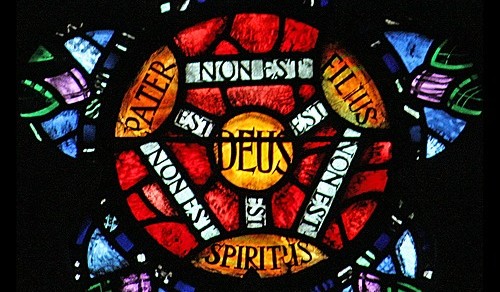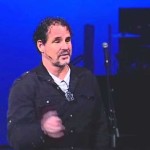We run our website the way we wished the whole internet worked: we provide high quality original content with no ads. We are funded solely by your direct support. Please consider supporting this project.

Does the Doctrine of the Trinity Matter?
Jesus reveals the greatest, most beautiful, and mysterious aspect of God when he, despite being himself God Incarnate, relates to God as his “Father” and refers to God as “the Holy Spirit.” There is, of course, only one God (1 Cor 8:6). Yet Jesus reveals that God somehow exists as Father, Son and Holy Spirit. We find God’s threefold personality revealed throughout the New Testament (e.g. 2 Cor 13:14, Matt 28:19, 1 Cor 12:4-6). It’s not just that God plays three “roles,” as some have taught. Rather, the New Testament reveals that God eternally exists as three distinct divine Persons. God is, in some sense, a loving divine community.
Throughout church history the threefold nature of God has been referred to as “the Trinity.” The word “Trinity” isn’t used in Scripture, but it’s a convenient way to summarize that New Testament’s teaching that God is Father, Son and Holy Spirit.
As with the Incarnation, it’s impossible for us to understand fully how this can be. The best we can do is come up with analogies.
For example, some have suggested the Trinity is mirrored in the threefold nature of the human psyche. This mental exercise illustrates this. Ask yourself: “When I think, who is talking and who is listening?” Notice that, in the very act of thinking, you’re manifesting a sort of plurality in your own mind. And notice that this plurality includes a relationship with yourself. You may love yourself (and thus approve of what you’re saying to yourself) or hate yourself (and thus disapprove of what you’re saying to yourself), but either way, you clearly have a relationship with yourself. So, the very act of thinking reveals that we are comprised of a self, a self-image and a relationship between the two. This plurality-amidst-unity is something like the Trinity.
An even better analogy is to imagine three people who are fully submitted to one another and are perfectly united in love and purpose. While each person in this perfect loving community would retain their distinct personhood, the heart and mind of each person would be completely surrendered to the other two. In a very real sense, therefore, this perfect community would experience, think and act as a single agent. This plurality-amidst-unity is again something like the way God is, according to the New Testament.
The revelation that God is an eternal, loving, divine community is the most foundational teaching of the Bible, for it reveals that God is, in his very eternal nature, perfect love. God is love (1 Jn 4:16). Love isn’t merely something God does; perfect love is what God eternally is.
It’s impossible to believe that “God is love” unless you conceive of God as an eternal community, for love is only possible between personal beings. If God existed alone by himself prior to the creation of the world, as Judaism and Islam teach, God could not be eternally loving within himself. God would need to create other personal agents in order to have someone to love. For Judaism and Islam, love can only be something God does, not the essence of who he eternally is. Among all the world religions, Christianity is the only one that presents a God whose very essence is love.
Since Jesus is the definitive revelation of God, we have to look to him to discover what God’s love is like—which is to say, to discover what God himself is like (1 Jn 3:16). And what we find when we do this is that the love that characterizes God’s essence is unfathomably beautiful and incomprehensibly self-sacrificial. Think about it. God crossed an infinite distance and paid the highest price imaginable to rescue a rebellious race of people who wanted nothing to do with him. In Jesus, the One who created all that is and who holds every molecule in existence (Heb 1:2) became a human being and died a hellish death out of love for a race of people who couldn’t have deserved it less!
This is the kind of love God is. The shockingly humble, other-oriented, submissive love that God expresses toward us while we were yet sinners (Rom 5:8) reflects the perfect, other-oriented love that God eternally is as Father, Son and Holy Spirit throughout eternity. This is antithetical to what fallen humans expect God to be like, and thus antithetical to most pictures of God or of gods we find people believing in throughout history. In sharp contrast to Zeus, Allah and (unfortunately) many people’s conception of Yahweh, the true God reveals his infinite greatness by becoming a small baby who grew up to be a crucified criminal. For the greatness of the true God is the greatness of shocking, unfathomable, incomprehensible, unsurpassable love. This is the Trinity.
Category: Q&A
Tags: God, God is Love, Jesus, Love, The Holy Spirit, Trinity
Topics: Trinity
Related Reading

What Happened on the Cross?
Since the time of Anselm (11th century), and especially since the Reformation in the 16th century, the tendency of the Western church has been to focus almost all of its attention on the anthropological dimension of the atonement, usually to the neglect of the cosmic dimension that is central to the NT. In the standard…

The Cross in the Manger, Part 2
While some shepherds were tending their flock, an angel appeared to them announcing “good news that will cause great joy for all the people,” for it news about “a Savior…the Messiah, the Lord” (Lk 2:10-11). Most Jews of this time expected a Messiah who would save them by vanquishing their Roman oppressors and liberating Israel…

The Incarnation: More Than a Rescue Mission
A mistake people often make concerning the Incarnation is that they fail to distinguish the eternal plan of God to unite himself with humanity in Christ, on the one hand, from the atoning significance this plan acquired after the fall, on the other. Some therefore think of the Incarnation as a sort of “Plan B”…

Sermon Clip: Escaping the Twilight Zone God
In this sermon clip from Woodland Hills Church, Greg Boyd discusses how in an episode of the Twilight Zone, a young boy gained omnipotent powers, and people were forced to accept his every decision as good—or else. In the full sermon, Greg shows how many people view God this way, and he opens up another…

How Does God Hear All Our Prayers?
Q: At any given moment there are millions of people praying to God. How is it possible for God to pay attention to my little, silent prayer amidst all the chatter? The reason you or I can only effectively listen to one person at a time is because we only have a limited amount of…

Sermon Clip: The Worst of Sinners
In this short clip, Greg Boyd discusses Paul’s definition of love. In the full sermon, Greg talks about how in this dog eat dog world, we’re programmed to judge others. But to love others with unsurpassable worth, we must ascribe worth to them at cost to ourselves. In this sermon, Greg talks about how to…
